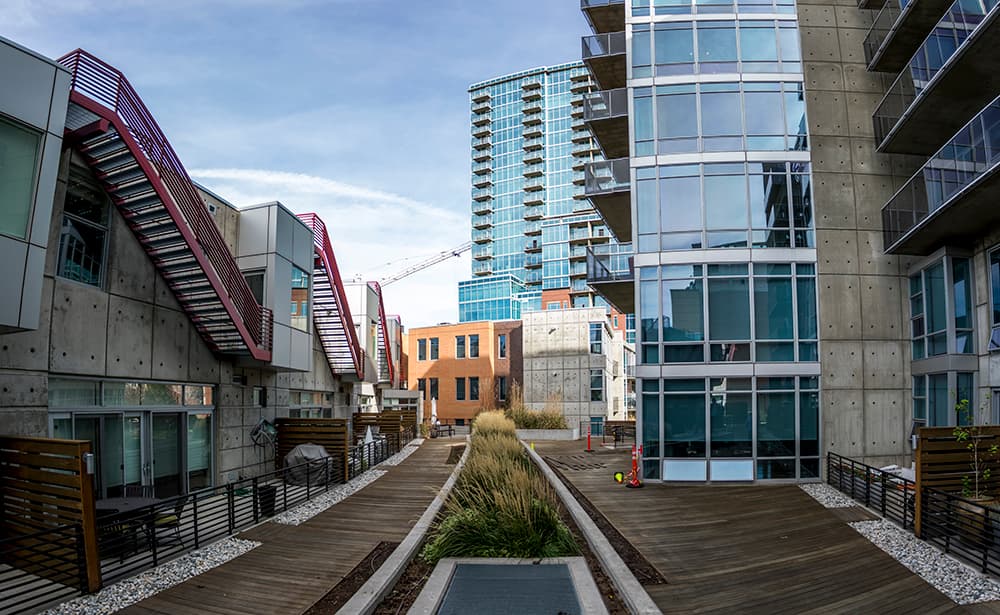Almost a year after voters decided to require rooftop gardens on large buildings to curb the urban effects of global warming, the Denver City Council passed a new version of the law Monday that will require new roofs to be white -- plus other caveats to increase energy efficiency and decrease temperatures citywide.
The white roofs or "cool roofs" reflect sunshine rather than absorb it, which will help achieve cooler temperatures on Denver's "urban heat island" -- the regional core where pollution keeps the temperature higher than surrounding areas. Denver has the third worst heat island in the country, according to the Denver Department of Public Health and Environment.
To meet the goals of the original ordinance, the law also requires property owners to choose from several other options: green space on the roof or elsewhere on the property, solar panels, enhancing the building's energy efficiency (certified by a third party like the U.S. Green Building Council), or paying into a fund for green space elsewhere in the city.
Elected officials, environmental advocates, and (most) reps from the real estate and roofing industries applauded the law as a compromise ironed out from a ballot measure with lots of wrinkles. A big one being that the green roofs mandated in the initial ordinance would be too heavy for up to 95 percent of the city's buildings, according to a study by Stantec, an engineering firm.
"We worked tirelessly to come to a compromise," said Brandon Rietheimer, who headed the ballot measure last year. The edited law will have "a greater climate impact" than the original, he said.
City Councilman Paul Kashmann said to Rietheimer, "Thank you for kicking the door open."
The law applies to most new buildings of at least 25,000 square feet from here on out. (Technically, Mayor Michael Hancock must first sign the bill.) Buildings of five stories and smaller are exempt from going beyond a white roof. When it's time for existing buildings to get new roofs, they'll be subject to the ordinance too.
At the current pace of global warming, Denver's climate is heading towards that of Pharr, Texas, according to the DDPHE.
DDPHE projects that in 2080, the city could see 79 days above 95 degrees if nothing changes. But environmentally friendly buildings aren't a fix-all.
"We're not gonna cool our city, we're gonna mitigate the warming that will happen anyway from global warming." said Katrina Managan, the city's energy efficient buildings lead.
The rules and regulations around the ordinance are still being drafted. City Councilwoman Mary Beth Susman wants to ensure the city measures the success of the ordinance "at least annually," she said.
"I think it just makes sense that if we're going to make a requirement about building the roofs that we understand whether they're performing the way we want them to perform for the goals of the ordinance," Susman said.
Some roofing experts spoke against the cool roof mandate but more spoke in favor.
Ellen Thorp, a lobbyist for EPDM Roofing Association, told council members she was "troubled" with what she perceived as a lack of roofing expertise on the task force that hammered out the new bill. But roofers were consulted throughout the entire process, according to several members of the task force, and those in favor outnumbered the opponents Monday.
"Codes are put in place to protect the constituents," said Roger Melvin, who owns a roofing company in Massachusetts. "The people of Denver voted for the green roof initiative." He said the argument against the law "solely has to do with dollar signs and nothing more than that."
Now that the ordinance passed, local roofers will be back in business. The city received just three permit applications for roof replacements on large buildings this year after receiving almost 700 in 2017, according to City Councilman Kevin Flynn.
"To fail to approve this, to me, would be like punting on first down," Flynn said.
The council passed the law unanimously, 12-0. City Councilman Chris Herndon was absent.












